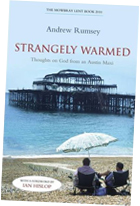| |
|
|
| Time's fool |
 |
October 2005
Riding in hearses, as I do quite often (it's that huge boot – you can get so much in) is a singular experience. The sense of suspended reality it affords is due in part to slow motion, wheezing along at a stately 15 miles per hour whilst the traffic tapeworms behind you. It's also to do with other people's response, many of whom stop to cross themselves as you pass – something that only rarely happens to me when on foot – and their always allowing for you, letting you through, moving at your pace. It's a little like being in The Truman Show.
Just recently, my limousine had inexplicably broken from the pack somewhere around South London's Heart of Drabness, Thornton Heath, and arrived at the cemetery with several minutes spare for the driver and myself to get to know each other a little better.
As we stood stiffly by the graveside, he leant over and, in the conspiratorial tone beloved of undertakers, remarked, "I don't know whether you've observed this, sir, but if you look closely around the cemetery, you'll notice that all the headstones face towards Croydon."
"It's quite deliberate," he added, just to hit the nail home.
I gawped around like a halibut, and realized to my astonishment that he was quite correct. Taking myself in hand, I recovered sufficiently to counter that, if my friend were to look even closer, he might detect the residents ever so slowly turning back the other way. Nevertheless, his remark had left a deep impression: the thought of so many prone souls gazing for all eternity, not on the heavenly Jerusalem, but on this high-rise, pedestrianised purgatory was both hilarious and horrific. In the midst of life, we are in Deptford, as the poet Martin Newell remarked – but in the midst of death I do not intend to be in Croydon.
And yet this memorable episode reinforced for me the vital truth that mortality is the basis of all humour. That and funny jokes, of course. In his wonderful book Wishful Thinking, American novelist Frederick Buechner suggests that one of the most significant passages in the Bible is where God tells Abraham and his nonagenarian wife, Sarah, that they are about to have a child. They proceed to snort their sandals off (Abraham "falling on his face" with merriment, according to Genesis chapter 17), while God keeps up the fun by telling them they are to name the boy Isaac, which, in Hebrew, means laughter. Buechner's explanation is well worth quoting in full:
"Why did the two old crocks laugh? They laughed because they knew only a fool would believe that woman with one foot in the grave was soon going to have her other foot in the maternity ward. They laughed because God expected them to believe it anyway. They laughed because God seemed to believe it. They laughed because they half-believed it themselves."
"Faith", he concludes, "is laughter at the promise of a child called laughter". Comedy lies in the gaps between what we ought to be, what we are, and what we just might be one day. Comic timing relies on eternity being written into the heart of man, and man knowing the absurd shortfall: bathos – the lapse from sublime to ridiculous – is thus a part of the comedian's stock-in-trade. In the biblical story, though, God appears to fool around with this familiar routine in the person of Jesus, whose resurrection rewrites the joke about the bloke who's alive, but then dies. The timing seems to be all over the place, but, for those who get it (and Christianity is a gag that plenty don't), the divine punchline makes sense of everything that went before. Moreover, it allows them to fool around with their time and place, too, until Kingdom come – in Thornton Heath as it is in heaven.
Those who really glimpse this eccentric vision are quite often depressive, or slightly unhinged – or both, as was supremely the case with William Blake, artist, poet and Test Cricket fan. A South Londoner himself, Blake's most balanced and clear-headed act seems to have been attempting to persuade his father at the age of ten that he had seen hosts of angels in a tree on Peckham Rye (to which his father no doubt responded, nonsense, boy, there are no trees on Peckham Rye).
Blake's epic, Jerusalem, is a cracked and fantastic epiphany of England infused by paradise, of earthly and heavenly places overlapping and time redeemed. To see and feel as he saw and felt is dazzling and disturbing in equal measure, and sufficient to make the mooniest poet sober up and rush to do something mundane, like fill in their tax return.
As for me, a slow car to Croydon is just the thing to bring me down to earth's pregnant pause and graveside grin, grasping at the promise of Isaac. Abraham and Sarah got the joke, and it was counted to them as faith.
And now the time returns again:
Our souls exult, and London's towers
Receive the Lamb of God to dwell
In England's green and pleasant bowers. |
|
|
 |
 |
 |
| Strangely Warmed by Andrew Rumsey is now available as a book. |
 |
 |
 |
 |
 |
| Stephen Tomkins' regular column of tales of religious lunacy from the far reaches of the Net |
 |
 |
 |
| Mark Howe's regular rant about Internet culture |
 |
 |
 |
| Also by Stephen Tomkins... a regular round-up of the saints of yore who were one wafer short of a full communion |
| |
|
|
|
|


